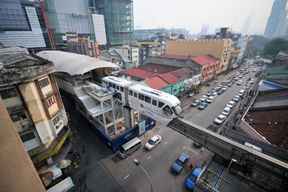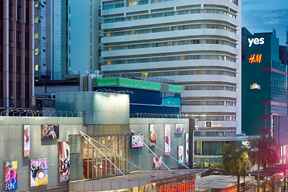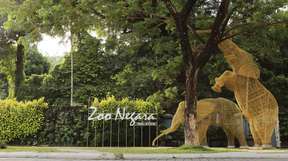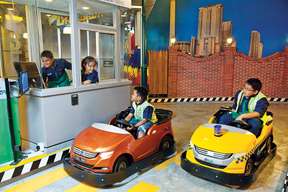
Cheap Flights From Kuala Lumpur International Airport (KUL), Airport in Malaysia
Open Map
Book Cheap Flights With Traveloka Coupon
Giảm ngay 50K
Frequently Asked Question
-
1. Domestic Flights: Arrive at least 2 hours before departure.
2. International Flights: Arrive at least 3 hours before departure.
3. Additional Considerations: Check with your airline for specific recommendations as times can vary depending on the airport and travel season.
-
1. Boarding Pass: Your gate number is usually printed on your boarding pass.
2. Airport Monitors: Check the flight information display screens located throughout the airport.
3. Mobile Apps: Use your airline’s mobile app for real-time updates on gate information.
4. Airport Staff: Ask airport staff for assistance if you’re unsure.
-
1. Varies by Airport: Most major airports operate 24/7, but smaller airports might have limited hours.
2. Check Online: Visit the airport’s official website for specific operating hours.
3. Customer Service: Call the airport’s customer service for up-to-date information.
-
1. Common Availability: Yes, most airports offer free Wi-Fi.
2. Access Instructions: Look for Wi-Fi signs around the terminal or check the airport’s website for access instructions.
3. Premium Services: Some airports offer paid premium Wi-Fi options for faster speeds.
-
1. Liquids over 3.4 ounces (100 milliliters).
2. Sharp objects (e.g., knives, scissors).
3. Flammable items (e.g., lighter fluid, fireworks).
4. Sporting goods (e.g., baseball bats, ski poles).
5. Tools (e.g., hammers, wrenches).
-
1. Government-issued photo ID (e.g., driver’s license, passport).
2. Boarding pass (either printed or digital).
-
1. Valid passport.
2. Visa (if required for your destination)
3. Boarding pass.
-
1. Availability: Yes, most international airports have duty-free shops.
2. Location: Typically located in the international departures area after security.
3. Operating Hours: Check the airport’s website for specific store hours.
-
1. Common Availability: Yes, most modern airports provide charging stations.
2. Locations: Look for charging kiosks or outlets near seating areas, gates, and lounges.
3. Airport Maps: Refer to airport maps or ask airport staff for locations of charging stations.
Cheap Flights From Kuala Lumpur International Airport (KUL), Airport in Malaysia
Basic Information About Kuala Lumpur International Airport (KUL) Malaysia
Airports are pivotal infrastructures in global transportation, serving as the primary hubs for air travel. They facilitate the departure and arrival of aircraft, enabling the movement of passengers and cargo across different regions and countries. Airports vary significantly in size and capacity, from small regional airports to vast international gateways. Regardless of their size, all airports share common elements designed to support aviation operations efficiently and safely.
Airport Classifications
- International Airports: Handle flights between different countries, equipped with customs and immigration facilities.
- Domestic Airports: Serve flights within the same country.
- Regional Airports: Smaller in scale, often serve local or regional flights.
- General Aviation Airports: Cater to private jets and smaller aircraft, not typically used for commercial passenger services.
Key Components
- Runways and Taxiways: Pathways for aircraft takeoff, landing, and movement around the airport.
- Terminal Buildings: Structures where passengers check-in, board, and disembark from aircraft. Terminals also house various services and amenities.
- Control Towers: Facilitate the management of air traffic, ensuring safe takeoff, landing, and ground operations.
- Cargo Facilities: Areas designated for handling freight and logistics operations.
Basic Airport Facilities and Services in Kuala Lumpur International Airport
Airports provide a wide range of facilities and services to ensure a smooth and comfortable experience for travelers. These amenities cater to various needs, from basic necessities to leisure and business requirements.
Passenger Services
- Check-in Counters: Where passengers confirm their presence for a flight, drop off luggage, and receive boarding passes.
- Security Screening: Essential for ensuring the safety of all travelers by screening passengers and luggage.
- Customs and Immigration: For international travelers, these services manage the entry and exit processes of different countries.
Amenities
- Lounges: Exclusive areas offering comfortable seating, refreshments, and other amenities for premium passengers.
- Retail and Duty-Free Shops: Offering a variety of goods, including souvenirs, electronics, and luxury items, often tax-free in international terminals.
- Dining Options: Range from fast food to fine dining, catering to diverse culinary preferences.
- Medical Services: Available for emergencies and minor health issues, often including pharmacies.
Connectivity and Business Services
- Wi-Fi and Charging Stations: Essential for staying connected and ensuring electronic devices are powered.
- Business Centers: Provide workspaces, printing, and other business services for travelers needing to work on the go.
Public Transportation Options at Kuala Lumpur International Airport
Efficient public transportation is crucial for connecting airports to surrounding areas, making travel convenient for passengers. Most airports offer a variety of options to suit different preferences and budgets.
Types of Public Transportation
- Airport Shuttles: Often provided by hotels or the airport itself, shuttles offer convenient transportation to and from the airport.
- Buses: Local and intercity bus services frequently connect airports to nearby towns and cities.
- Trains and Subways: Many major airports have direct rail links, providing fast and efficient transportation to city centers and beyond.
- Taxis and Ride-Sharing: Readily available at designated pick-up points, offering door-to-door service.
Considerations for Public Transportation
- Schedules and Frequency: It’s essential to check the availability and frequency of services, especially during off-peak hours.
- Cost: Public transportation can vary in cost, with buses typically being the most economical and taxis the most expensive.
- Accessibility: Ensure that the chosen mode of transport is accessible, especially for travelers with special needs or heavy luggage.
Explanation About Travel Tips and Guides
Traveling, whether for leisure or business, can be a complex process. Being well-prepared can significantly enhance the travel experience. Here are some essential travel tips and guides to help you navigate your journey smoothly.
Pre-Travel Preparation
- Documentation: Ensure all necessary travel documents, such as passports, visas, and boarding passes, are up-to-date and readily accessible.
- Packing: Pack smartly, adhering to airline baggage regulations. Consider carrying essentials like medications, a change of clothes, and important documents in your carry-on.
- Travel Insurance: Investing in travel insurance can provide peace of mind by covering unexpected events such as medical emergencies, trip cancellations, or lost luggage.
At the Airport
- Arrive Early: Allow ample time for check-in, security screening, and any other procedures, especially during peak travel times.
- Stay Informed: Monitor flight status for any changes or delays. Most airports provide real-time updates through displays and mobile apps.
- Utilize Amenities: Make use of available facilities such as lounges, dining options, and Wi-Fi to make your wait more comfortable.
During the Flight
- Stay Hydrated: Air travel can be dehydrating, so drink plenty of water.
- Move Around: On long flights, make sure to stretch and move around periodically to prevent discomfort and circulation issues.
- Entertainment and Comfort: Bring along entertainment options like books, movies, or music, and consider comfort items like neck pillows and eye masks.
Post-Arrival
- Customs and Immigration: Have your documents ready and filled out if necessary to expedite the process.
- Transportation Arrangements: Pre-arrange transportation from the airport to your final destination to avoid last-minute hassles.
- Stay Safe: Be aware of your surroundings, especially in unfamiliar locations, and take necessary precautions to ensure your safety and security.
Traveling can be a rewarding experience when well-prepared. By following these tips and utilizing available resources, you can navigate the complexities of air travel with ease and confidence.
Basic Information About Kuala Lumpur International Airport (KUL) Malaysia
Airports are pivotal infrastructures in global transportation, serving as the primary hubs for air travel. They facilitate the departure and arrival of aircraft, enabling the movement of passengers and cargo across different regions and countries. Airports vary significantly in size and capacity, from small regional airports to vast international gateways. Regardless of their size, all airports share common elements designed to support aviation operations efficiently and safely.
Airport Classifications
- International Airports: Handle flights between different countries, equipped with customs and immigration facilities.
- Domestic Airports: Serve flights within the same country.
- Regional Airports: Smaller in scale, often serve local or regional flights.
- General Aviation Airports: Cater to private jets and smaller aircraft, not typically used for commercial passenger services.
Key Components
- Runways and Taxiways: Pathways for aircraft takeoff, landing, and movement around the airport.
- Terminal Buildings: Structures where passengers check-in, board, and disembark from aircraft. Terminals also house various services and amenities.
- Control Towers: Facilitate the management of air traffic, ensuring safe takeoff, landing, and ground operations.
- Cargo Facilities: Areas designated for handling freight and logistics operations.
Basic Airport Facilities and Services in Kuala Lumpur International Airport
Airports provide a wide range of facilities and services to ensure a smooth and comfortable experience for travelers. These amenities cater to various needs, from basic necessities to leisure and business requirements.
Passenger Services
- Check-in Counters: Where passengers confirm their presence for a flight, drop off luggage, and receive boarding passes.
- Security Screening: Essential for ensuring the safety of all travelers by screening passengers and luggage.
- Customs and Immigration: For international travelers, these services manage the entry and exit processes of different countries.
Amenities
- Lounges: Exclusive areas offering comfortable seating, refreshments, and other amenities for premium passengers.
- Retail and Duty-Free Shops: Offering a variety of goods, including souvenirs, electronics, and luxury items, often tax-free in international terminals.
- Dining Options: Range from fast food to fine dining, catering to diverse culinary preferences.
- Medical Services: Available for emergencies and minor health issues, often including pharmacies.
Connectivity and Business Services
- Wi-Fi and Charging Stations: Essential for staying connected and ensuring electronic devices are powered.
- Business Centers: Provide workspaces, printing, and other business services for travelers needing to work on the go.
Public Transportation Options at Kuala Lumpur International Airport
Efficient public transportation is crucial for connecting airports to surrounding areas, making travel convenient for passengers. Most airports offer a variety of options to suit different preferences and budgets.
Types of Public Transportation
- Airport Shuttles: Often provided by hotels or the airport itself, shuttles offer convenient transportation to and from the airport.
- Buses: Local and intercity bus services frequently connect airports to nearby towns and cities.
- Trains and Subways: Many major airports have direct rail links, providing fast and efficient transportation to city centers and beyond.
- Taxis and Ride-Sharing: Readily available at designated pick-up points, offering door-to-door service.
Considerations for Public Transportation
- Schedules and Frequency: It’s essential to check the availability and frequency of services, especially during off-peak hours.
- Cost: Public transportation can vary in cost, with buses typically being the most economical and taxis the most expensive.
- Accessibility: Ensure that the chosen mode of transport is accessible, especially for travelers with special needs or heavy luggage.
Explanation About Travel Tips and Guides
Traveling, whether for leisure or business, can be a complex process. Being well-prepared can significantly enhance the travel experience. Here are some essential travel tips and guides to help you navigate your journey smoothly.
Pre-Travel Preparation
- Documentation: Ensure all necessary travel documents, such as passports, visas, and boarding passes, are up-to-date and readily accessible.
- Packing: Pack smartly, adhering to airline baggage regulations. Consider carrying essentials like medications, a change of clothes, and important documents in your carry-on.
- Travel Insurance: Investing in travel insurance can provide peace of mind by covering unexpected events such as medical emergencies, trip cancellations, or lost luggage.
At the Airport
- Arrive Early: Allow ample time for check-in, security screening, and any other procedures, especially during peak travel times.
- Stay Informed: Monitor flight status for any changes or delays. Most airports provide real-time updates through displays and mobile apps.
- Utilize Amenities: Make use of available facilities such as lounges, dining options, and Wi-Fi to make your wait more comfortable.
During the Flight
- Stay Hydrated: Air travel can be dehydrating, so drink plenty of water.
- Move Around: On long flights, make sure to stretch and move around periodically to prevent discomfort and circulation issues.
- Entertainment and Comfort: Bring along entertainment options like books, movies, or music, and consider comfort items like neck pillows and eye masks.
Post-Arrival
- Customs and Immigration: Have your documents ready and filled out if necessary to expedite the process.
- Transportation Arrangements: Pre-arrange transportation from the airport to your final destination to avoid last-minute hassles.
- Stay Safe: Be aware of your surroundings, especially in unfamiliar locations, and take necessary precautions to ensure your safety and security.
Traveling can be a rewarding experience when well-prepared. By following these tips and utilizing available resources, you can navigate the complexities of air travel with ease and confidence.








































 Facebook
Facebook Instagram
Instagram TikTok
TikTok Youtube
Youtube Telegram
Telegram
